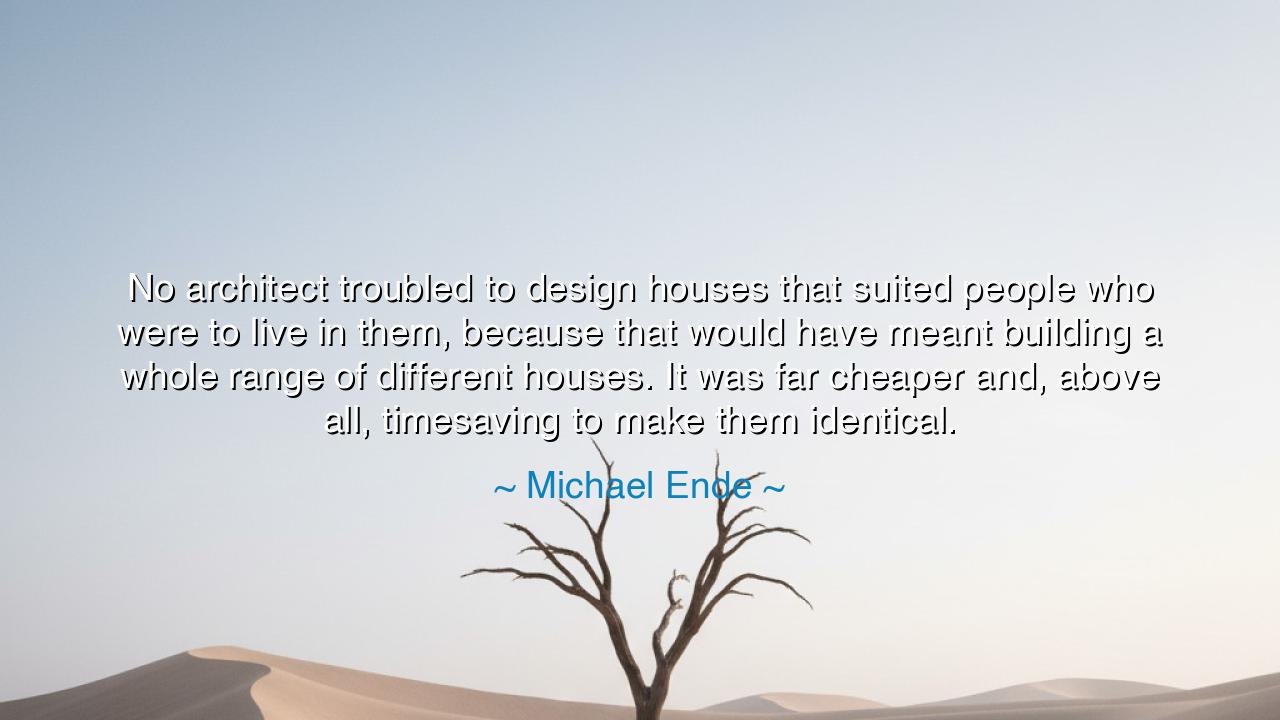
No architect troubled to design houses that suited people who
No architect troubled to design houses that suited people who were to live in them, because that would have meant building a whole range of different houses. It was far cheaper and, above all, timesaving to make them identical.






Host: The soft creak of the chair seemed unusually loud in the quiet room. Jack sat back, his fingers tapping lightly on the edge of the table, deep in thought. Jeeny stood by the window, gazing out at the world beyond — a world where things weren’t always built to fit the needs of the people who used them. There was something about the conversation that lingered in the air, like an unspoken truth waiting to be unpacked.
Jeeny: (softly) “Michael Ende once said, ‘No architect troubled to design houses that suited people who were to live in them, because that would have meant building a whole range of different houses. It was far cheaper and, above all, timesaving to make them identical.’”
Jack: (pauses, reflecting) “That’s such a powerful statement. It speaks to this idea of efficiency, of doing things quickly, without really considering the people who will experience them. It’s like sacrificing individuality for the sake of uniformity.”
Jeeny: “It’s that classic case, isn’t it? Where speed and cost-effectiveness trump humanity and personalization. Architects could have designed homes that fit the lives of the people who would inhabit them, but that would have meant real thought, real effort. It’s much easier to make everything the same.”
Jack: “But making everything the same isn’t just cheaper. It’s easier. It’s more predictable. And in a world that values efficiency and standardization, people often forget that those very things can leave us feeling lost, anonymous, disconnected.”
Host: The soft hum of the city outside felt distant, almost irrelevant, to the depth of the conversation happening in the room. Inside, the air was thick with the weight of what they were discussing — how often the world is shaped by convenience, by uniformity, and how those choices affect the individuals who have to live within them.
Jeeny: “It’s easy to see how it happens. The desire for uniformity leads to the simplification of life. It’s much easier to create something that looks the same for everyone, to build houses that fit a mold, than to truly think about the unique needs of the people who will live in them.”
Jack: “But what’s lost in that? What happens when we stop considering the needs of the individuals and just start creating things that fit the masses? We lose that connection, that human element.”
Jeeny: “Exactly. We start building for efficiency, for the sake of a quick answer, without realizing that personalization, the ability to fit something to your needs, can bring about a deeper sense of belonging, a feeling of truly owning a space.”
Host: The rain outside began to tap against the window, adding a soft rhythm to the already reflective atmosphere. Jeeny’s voice seemed to echo that rhythm, her words carrying a quiet truth about how the world often prioritizes the collective over the individual — even when it means sacrificing comfort, uniqueness, and real connection.
Jack: “It’s like everything today is made for convenience. Everything’s about fitting into a pre-made mold, whether it’s houses, products, or even relationships. But in that pursuit of efficiency, we lose the richness of diversity, the beauty of difference.”
Jeeny: “Yes. It’s ironic, isn’t it? In trying to make life easier, we often make it less meaningful. A house isn’t just a structure. It’s supposed to be a home — a space that reflects the person who lives there, the life they lead, the things that matter to them. But when everything is identical, it’s like we lose the chance to express ourselves.”
Jack: “And it’s not just about buildings. It’s about how we’ve come to accept a world where conformity reigns, where we don’t even question the lack of individuality in the things that surround us. We start to live within these narrow definitions, believing they’re all we deserve.”
Host: The soft click of the clock filled the room, but the time seemed irrelevant now. The conversation was no longer about houses or architecture — it had grown into something deeper, a reflection on how uniformity in the world leads to a lack of connection, how it sacrifices humanity in favor of efficiency.
Jeeny: “And the sad part is, we don’t even realize what we’ve lost until it’s gone. Until we’re standing in a space that feels empty, even though it’s filled with the things we thought we wanted.”
Jack: “Maybe the question is, what would it take to break free from that? To start designing our lives, our spaces, around who we really are, not just what’s easiest or most efficient?”
Jeeny: “I think it starts with acknowledging the difference — recognizing that no two people are the same, no two needs are identical. And from there, we build a world that’s diverse, that’s personal.”
Host: The room felt quieter now, as though their thoughts had settled into a deeper understanding. The world outside continued to move, but inside, there was the feeling of something shifting — an awareness that individuality and personalization were more than just luxuries. They were essential to creating a life that felt authentically yours.
And as the scene faded, Michael Ende’s words echoed —
that uniformity may be efficient,
but it sacrifices the richness of individuality.
For the true beauty of life
is in embracing diversity,
in recognizing that each person, each need,
deserves a space that reflects who they are.
In the pursuit of personalization,
we find connection.
And in that connection,
we find true belonging.






AAdministratorAdministrator
Welcome, honored guests. Please leave a comment, we will respond soon